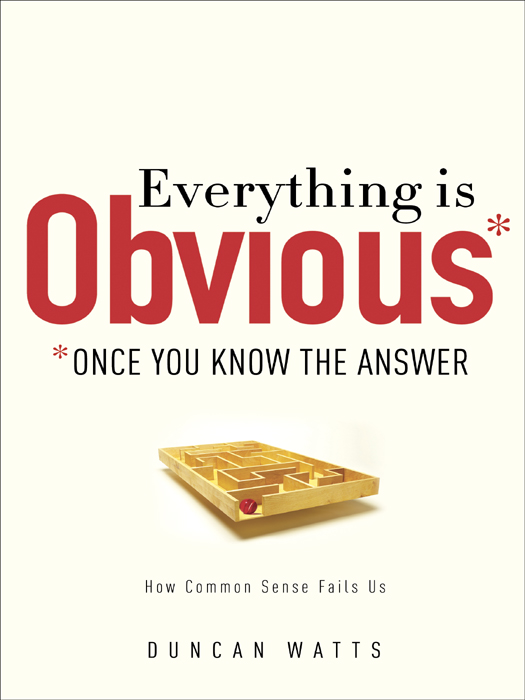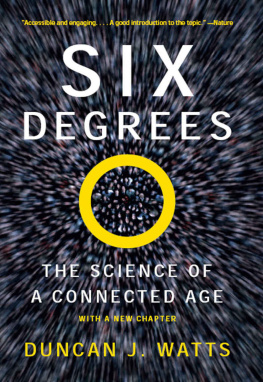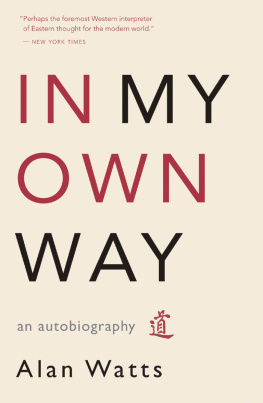Duncan J. Watts - Everything Is Obvious*: *Once You Know the Answer
Here you can read online Duncan J. Watts - Everything Is Obvious*: *Once You Know the Answer full text of the book (entire story) in english for free. Download pdf and epub, get meaning, cover and reviews about this ebook. year: 2011, publisher: Crown Business, genre: Romance novel. Description of the work, (preface) as well as reviews are available. Best literature library LitArk.com created for fans of good reading and offers a wide selection of genres:
Romance novel
Science fiction
Adventure
Detective
Science
History
Home and family
Prose
Art
Politics
Computer
Non-fiction
Religion
Business
Children
Humor
Choose a favorite category and find really read worthwhile books. Enjoy immersion in the world of imagination, feel the emotions of the characters or learn something new for yourself, make an fascinating discovery.

- Book:Everything Is Obvious*: *Once You Know the Answer
- Author:
- Publisher:Crown Business
- Genre:
- Year:2011
- Rating:4 / 5
- Favourites:Add to favourites
- Your mark:
- 80
- 1
- 2
- 3
- 4
- 5
Everything Is Obvious*: *Once You Know the Answer: summary, description and annotation
We offer to read an annotation, description, summary or preface (depends on what the author of the book "Everything Is Obvious*: *Once You Know the Answer" wrote himself). If you haven't found the necessary information about the book — write in the comments, we will try to find it.
Everything Is Obvious*: *Once You Know the Answer — read online for free the complete book (whole text) full work
Below is the text of the book, divided by pages. System saving the place of the last page read, allows you to conveniently read the book "Everything Is Obvious*: *Once You Know the Answer" online for free, without having to search again every time where you left off. Put a bookmark, and you can go to the page where you finished reading at any time.
Font size:
Interval:
Bookmark:


Copyright 2011 by Duncan Watts
All rights reserved.
Published in the United States by Crown Business,
an imprint of the Crown Publishing Group,
a division of Random House, Inc., New York.
www.crownpublishing.com
Crown Business is a trademark and the Rising Sun colophon is a registered trademark of Random House, Inc.
Library of Congress Cataloging-in-Publication Data
Watts, Duncan J., 1971
Everything is obvious : once you know the answer /
Duncan Watts. 1st ed.
p. cm.
1. Thought and thinking. 2. Common sense. 3. Reasoning.
I. Title.
BF441.W347 2011
153.4dc22
2010031550
eISBN: 978-0-385-53169-6
Jacket design by Laura Duffy
Jacket Photographs George Diebold Photography / Getty Images
v3.1
For Jack and Lily
In January 1998, about halfway through my first year out of graduate school, my housemate at the time handed me a copy of New Scientist magazine containing a book review by the physicist and science writer John Gribbin. The book Gribbin was reviewing was called Tricks of the Trade, by the Chicago sociologist Howard Becker, and was mostly a collection of Beckers musings on how to do productive social science research. Gribbin clearly hated it, judging Beckers insights to be the kind of self-evident checks that real scientists learn in the cradle. But he didnt stop there. He went on to note that the book had merely reinforced his opinion that all of social science was something of an oxymoron and that any physicist threatened by cuts in funding ought to consider a career in the social sciences, where it ought to be possible to solve the problems the social scientists are worked up about in a trice.
There was a reason my roommate had given me this particular review to read and why that particular line stuck in my head. I had majored in physics at college, and at the time when I read Gribbins review I had just finished my PhD in engineering; I had written my dissertation on the mathematics of what are now called small-world networks.in sociology. So I felt that in a sense I was embarking on a miniature version of Gribbins proposed experiment. And to be honest, I might have suspected that he was right.
Twelve years later, however, I think I can say that the problems sociologists, economists, and other social scientists are worked up about are not going to be solved in a trice, by me or even by a legion of physicists. I say this because since the late 1990s many hundreds, if not thousands of physicists, computer scientists, mathematicians, and other hard scientists have taken an increasing interest in questions that have traditionally been the province of the social sciencesquestions about the structure of social networks, the dynamics of group formation, the spread of information and influence, or the evolution of cities and markets. Whole fields have arisen over the past decade with ambitious names like network science and econophysics. Datasets of immense proportions have been analyzed, countless new theoretical models have been proposed, and thousands of papers have been published, many of them in the worlds leading science journals, such as Science, Nature, and Physical Review Letters. Entire new funding programs have come into existence to support these new research directions. Conferences on topics such as computational social science increasingly provide forums for scientists to interact across old disciplinary boundaries. And yes, many new jobs have appeared that offer young physicists the chance to explore problems that once would have been deemed beneath them.
The sum total of this activity has far exceeded the level of effort that Gribbins offhand remark implied was required. So what have we learned about those problems that social scientists were so worked up about back in 1998? What do we really know about the nature of deviant behavior or the origins of social practices or the forces that shift cultural normsthe
If theres a lesson here, you might think it would be that the problems of social science are hard not just for social scientists, but for physicists as well. But this lesson, it seems, has not been learned. Quite to the contrary, in fact, in 2006 Senator Kay Bailey Hutchison, a Republican from Texas, proposed that Congress cut the entire social and behavioral sciences budget of the National Science Foundation. Bailey Hutchison, it should be noted, is not antisciencein 2005 she proposed doubling funds for medical science. Rather, it was exclusively social science research that she felt is not where we should be directing [NSF] resources at this time. Ultimately the proposal was defeated, but one might still wonder what the good senator was thinking. Presumably she doesnt think that social problems are unimportantsurely no one would argue that immigration, economic development, and inequality are problems that are somehow unworthy of attention. Rather it appears that, like Gribbin, she doesnt consider social problems to be scientific problems, worthy of the prolonged attention of serious scientists. Or as
Senators Hutchinson and Coburn are not alone in their skepticism of what social science has to offer. Since becoming a sociologist, I have frequently been asked by curious outsiders what sociology has to say about the world that an intelligent person couldnt have figured out on their own. Its a reasonable question, but as the sociologist Paul Lazarsfeld pointed out nearly sixty years ago, it also reveals a common misconception about the nature of social science. Lazarsfeld was writing about The American Soldier, a then-recently published study of more than 600,000 servicemen that had been conducted by the research branch of the war department during and immediately after the Second World War. To make his point, Lazarsfeld listed six findings from the study that he claimed were representative of the report. For example, number two was that Men from rural backgrounds were usually in better spirits during their Army life than soldiers from city backgrounds. Aha, says Lazarsfelds imagined reader, that makes perfect sense. Rural men in the 1940s were accustomed to harsher living standards and more physical labor than city men, so naturally they had an easier time adjusting. Why did we need such a vast and expensive study to tell me what I could have figured out on my own?
Why indeed. But Lazarsfeld then reveals that all six of the findings were in fact the exact opposite of what the study actually found. It was city men, not rural men, who were happier during their Army life. Of course, had the reader been told the real answers in the first place she could just as easily have reconciled them with other things that she
Lazarsfeld was talking about social science, but what I will argue in this book is that his point is equally relevant to any activitywhether politics, business, marketing, philanthropythat involves understanding, predicting, changing, or responding to the behavior of people. Politicians trying to decide how to deal with urban poverty already feel that they have a pretty good idea why people are poor. Marketers planning an advertising campaign already feel that they have a decent sense of what consumers want and how to make them want more of it. And policy makers designing new schemes to drive down healthcare costs or to improve teaching quality in public schools or to reduce smoking or to improve energy conservation already feel that they can do a reasonable job of getting the incentives right. Typically people in these positions do not expect to get everything right all the time. But they also feel that the problems they are contemplating are mostly within their ability to solvethat its not rocket science, as it were.arguably are much harder
Font size:
Interval:
Bookmark:
Similar books «Everything Is Obvious*: *Once You Know the Answer»
Look at similar books to Everything Is Obvious*: *Once You Know the Answer. We have selected literature similar in name and meaning in the hope of providing readers with more options to find new, interesting, not yet read works.
Discussion, reviews of the book Everything Is Obvious*: *Once You Know the Answer and just readers' own opinions. Leave your comments, write what you think about the work, its meaning or the main characters. Specify what exactly you liked and what you didn't like, and why you think so.








